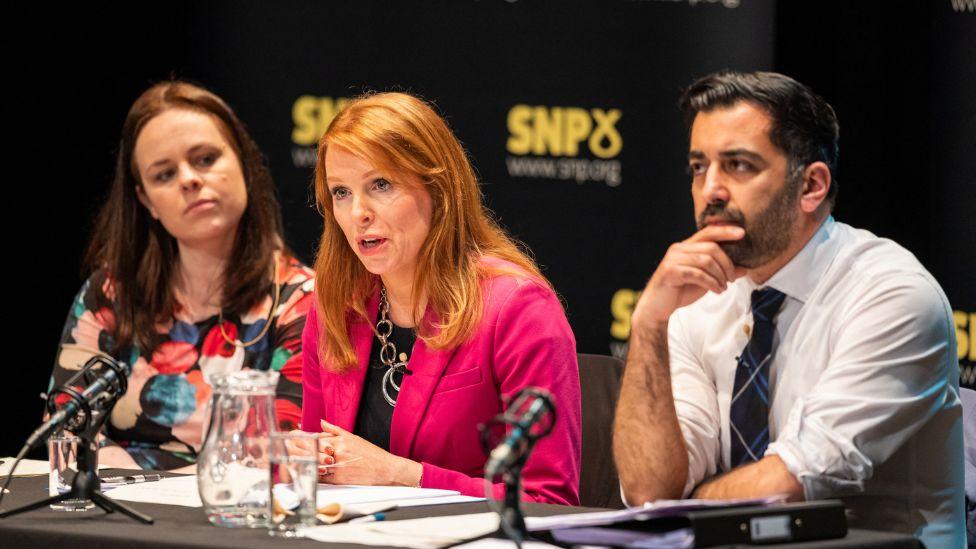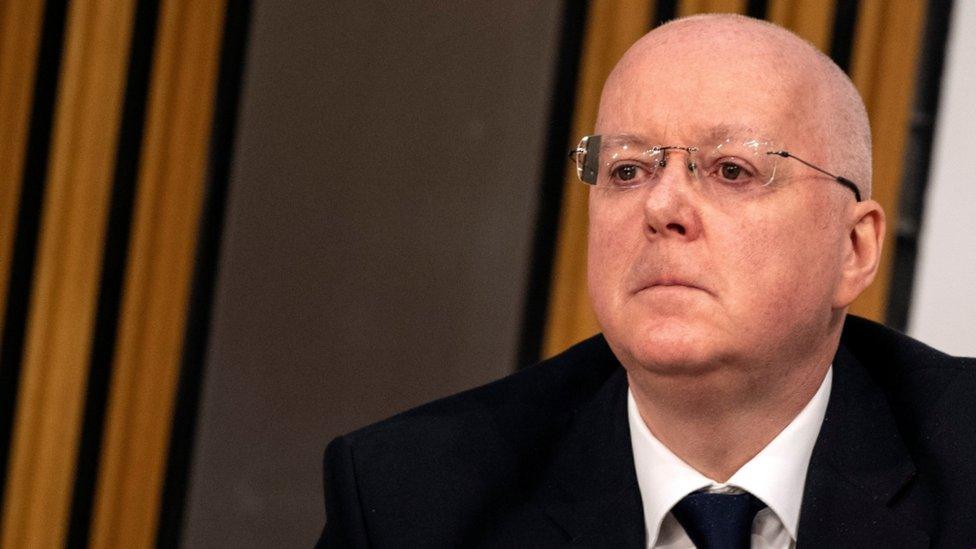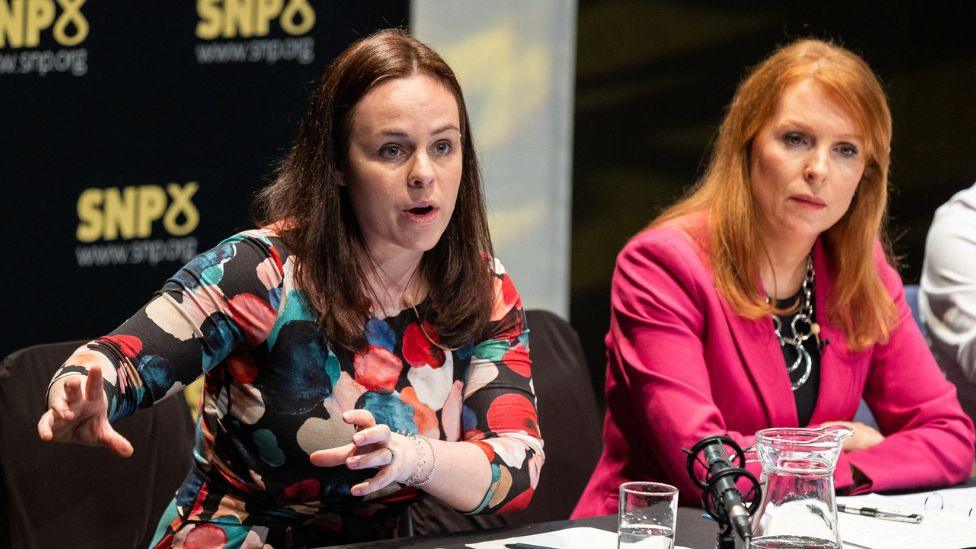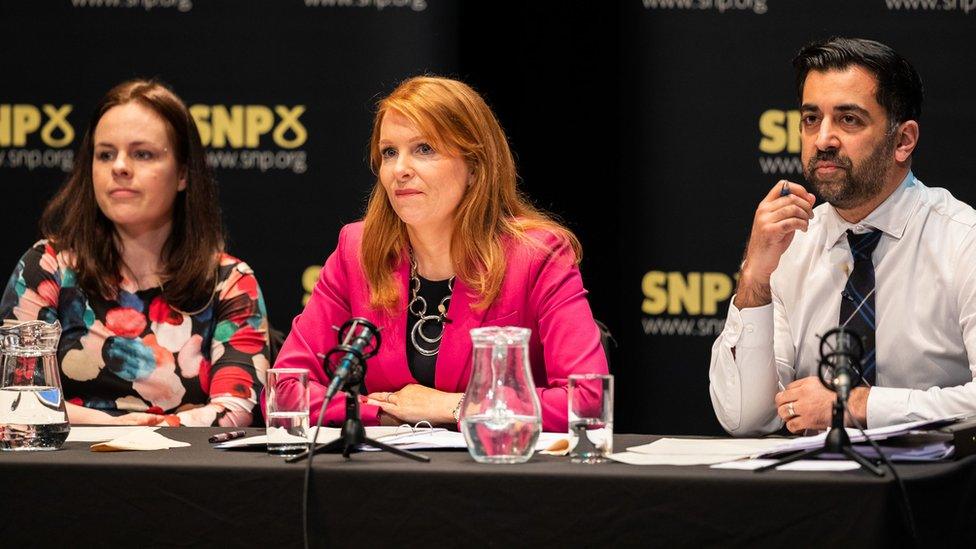SNP says its membership has fallen to 72,000
- Published

Leadership candidates Kate Forbes, Ash Regan and Humza Yousaf had pushed for the membership figures to be published
The SNP's membership has fallen to just over 72,000, the party has confirmed amid a row over the integrity of its leadership race.
Candidates Ash Regan and Kate Forbes had demanded to know how many members were eligible to vote in the contest to succeed Nicola Sturgeon.
The party initially refused to do so - but has now told the candidates that it has 72,186 members.
It means it has lost 32,000 members from the 104,000 it had two years ago.
The SNP's membership hit a peak of 125,000 in 2019 as support for the party surged in the wake of the independence referendum but had dropped to 85,000 by the end of last year.
Its Westminster leader, Stephen Flynn, told BBC Scotland earlier this week he had "no idea" how many members the party had, but that "I think the last time I heard it was about 100,000".
Ms Forbes' campaign manager, Michelle Thomson MSP, said she was pleased that "common sense has prevailed" and the membership numbers had been published - but that the "alarming drop in members shows that the party needs a change in direction".
Ms Regan issued a statement that said only: "I get things done", with her campaign questioning on Twitter, external whether the big drop in membership - which it linked to the government's controversial gender reforms - was a reason for Ms Sturgeon's resignation.
She later told BBC Scotland's Drivetime programme that it had been several weeks since she first asked for the membership figures to be released, but that she was pleased it had been as "we want to show that the SNP is fair, transparent and accountable".
Ms Regan also repeated her call for an independent observer to be appointed to oversee the leadership election.
The SNP's national secretary, Lorna Finn, wrote to the candidates earlier on Thursday in an attempt to address their concerns about transparency.
A spokesperson for the party said: "All three candidates were successful in parliamentary selection contests using exactly the same voting system and independent ballot services firm.
"The national secretary has again confirmed all necessary safeguards are in place to protect the integrity of the ballot."
The third candidate in the contest, Health Secretary Humza Yousaf, said his two rivals had produced no tangible evidence that would throw the integrity of the election process into question.
But he added that it had been "a bit of an own goal" for the party not to have published the figure at the start of the process, adding: "I don't know why they didn't - they should have done and certainly if I'm the leader of the party I'll make sure they are published annually."


This is a massive drop in the SNP's membership in a relatively short period of time and it seems to have been particularly acute over the last few months.
The party has lost more than 10,000 members since the end of last year when the row over reform of the process for legally changing gender was raging.
It is not possible to measure the extent to which that controversy may be responsible for members leaving.
The party's president Mike Russell has suggested cost of living pressures could offer an alternative explanation.
Falling membership also places Nicola Sturgeon's decision to stand down in a new context, albeit that she insisted it was not a response to short term pressures.
The SNP remains the largest political party in Scotland but it is considerably smaller now compared to its post referendum peak of around 125,000.

Mr Yousaf is widely seen as being the favoured candidate of Ms Sturgeon and the SNP hierarchy as a whole, with Ms Regan previously claiming that the party HQ was "bussing in" his supporters to hustings events.
Ms Regan has also questioned the role of SNP chief executive Peter Murrell - Ms Sturgeon's husband - in the leadership contest, saying it was a "clear conflict of interest".
Her campaign had also said it had concerns about votes from deceased party members or those who have allowed their membership to expire.
An open letter sent on behalf of Ms Regan and Ms Forbes to Mr Murrell had called on him to clarify how many "paid-up" members the party has, and the number of digital and postal voting papers that have been released.

Ms Regan and Ms Forbes had urged Peter Murrell to clarify how many members the party currently has
Ms Sturgeon denied her party was in crisis and said she had "100% confidence" in the process as she left her penultimate First Minister's Questions on Thursday.
She added: "My party is having a democratic leadership election - growing pains for any organisation can be painful, but they are important.
"I think it's incumbent for the three candidates standing to succeed me that they remember the task is to retain the trust of the Scottish people that we have won consistently over, not just the eight years of my leadership, but consistently since 2007."
SNP president Mike Russell told BBC Scotland the highest standards were being observed but accepted that the membership figures should have been published earlier.
"The party has to unite after this," he said. "We have an important job to do for Scotland and I'm quite sure the three candidates are capable of that."
Scottish Conservatives chairman Craig Hoy said the SNP "had to be dragged kicking and screaming into even releasing these numbers".
He added: "The SNP government are out-of-touch with the real priorities of Scotland and it seems tens of thousands of now former members have also come to that conclusion and decided enough is enough."
The leadership ballot is being managed by Southampton-based polling firm Mi-Voice, which the SNP has used for internal contests since 2013. The result is due to be announced on 27 March.
- Published16 March 2023

- Published15 March 2023
